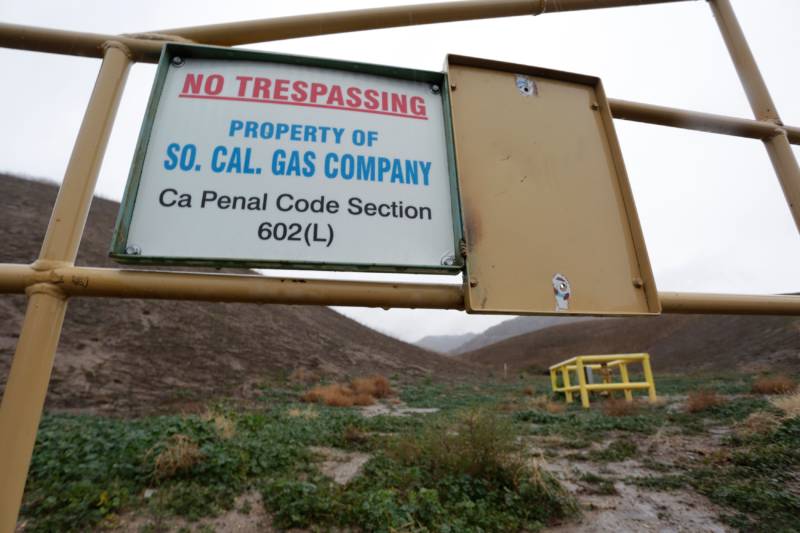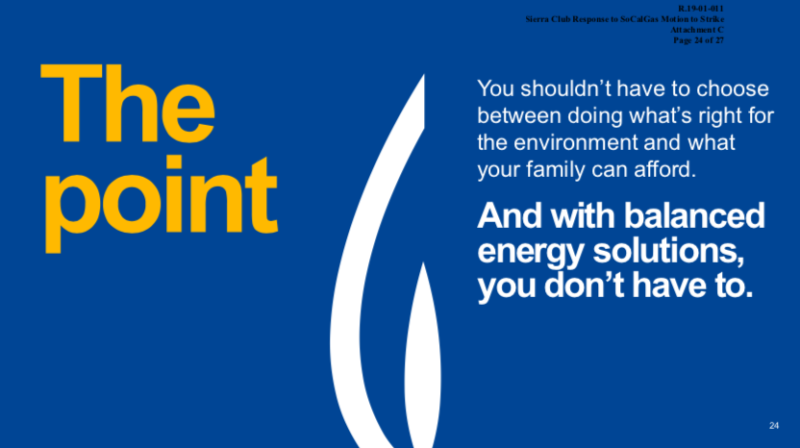Right now, regulators at the California Public Utilities Commission are weighing exactly how and when to wean the state away from natural gas. That means Southern California Gas is fighting for its future, and the Public Advocates Office, an independent watchdog within the CPUC, says the utility’s not fighting fairly, lying to regulators and violating ethics and other rules in the process.
SoCalGas Admits Funding 'Front' Group in Fight for Its Future

SoCalGas, a Sempra Company, produces only one thing; with the state aiming for 100% renewable energy by 2045, the company’s days of selling natural gas to millions of customers are numbered.
“SoCalGas is really clear that it sees the state’s climate goals really as an existential threat,” said Mike Campbell, a program manager with the Public Advocates Office, which represents ratepayers in commission proceedings.
Campbell’s office argues that the utility’s tactics include lying to regulators, undermining efficiency codes and standards, and “astroturfing”: funding a seemingly independent advocacy group with ratepayer money. The independent watchdog is asking the commission to sanction SoCalGas, investigate its relationship with the nonprofit Californians for Balanced Energy Solutions, and withhold bonuses that would benefit the utility’s shareholders.
While utilities commonly work to sway regulatory outcomes, critics say what SoCalGas is doing is out of the ordinary.

“We know we have to move past gas to address climate change, to improve air quality, and so on,” said Earthjustice attorney Matt Vespa, who was among the first to raise questions about the utility’s tactics. “They’ve been fighting against this time and again; now they’re amplifying their efforts even more.”
SoCalGas countered in a statement that while it has respect for the Public Advocates Office, the claims that the company lied or misled regulators are “simply untrue.” SoCalGas argues that “[c]onsumers want choice,” and the company is offering that.
Who is Californians for Balanced Energy Solutions?
Natural gas heats water for showers, warms homes in winter, tumbles clothes dry, and cooks food in many California kitchens. That’s why buildings contribute about 25% of the state’s carbon pollution; they’re an often overlooked source of fossil fuel emissions.
Californians for Balanced Energy Solutions, or C4BES, focuses on kitchens. Its website features homey, multiracial photos of happy people cooking food, all gathered around flame-fed stoves. The nonprofit registered with the state in January, saying it was “representing the interests of gas industrial, commercial and residential users.”
Critics, including Earthjustice and the Sierra Club, argue that the group is a front; documents filed with the CPUC reveal that SoCalGas paid consultants to set up C4BES. Language the utility circulated in recruiting for the organization is nearly word-for-word the same as in the core principles now on the C4BES website.
Earthjustice’s Vespa says he first got suspicious of C4BES in the spring. He and other environmental advocates dug into it and found that last October, SoCalGas public policy manager Ken Chawkins offered a “welcome…aboard” to new C4BES board chair Matt Rahn, a Temecula city council member. SoCalGas itself has a representative on the C4BES board, as do eight organizations that received donations from the utility.
In a statement, Southern California Gas says it has been transparent in its role starting and funding the nonprofit.
But when the organization joined the regulatory proceeding, saying it wanted to speak for gas users, C4BES didn’t declare any relationship with a regulated investor-owned utility.
Earthjustice, Sierra Club and the Public Advocates office say that’s a big deal. Using shareholder money, utilities can advocate for themselves when regulators make rules. But critics say SoCalGas shouldn’t be able to spend money from shareholders or its customers to create a “separate” group to give itself a second voice.

Given the overlap between what the utility says and what the nonprofit says, “the way that SoCal Gas is attempting to inject those comments and ideas into the discourse, I think they should just raise those directly,” said Campbell.
Vespa calls the relationship between the utility and the nonprofit outrageous. “It just really does fundamentally undermine the integrity of commission proceedings and transparency,” he said.
Berkeley law lecturer Steve Weissman, a former administrative law judge at the CPUC, says he’s seen SoCalGas do this before: create organizations, populate them with supporters, and use the organizations’ support to bolster their points. But neither he nor Vespa has ever heard of a nonprofit funded by a utility seeking to become a party to a rulemaking like this.
“When the merits of the action you want to take stand on their own,” Weissman said, “you don’t have to be deceptive about selling it.”
Who’s Paying for This Advocacy?
Investor-owned utilities are tightly regulated in how they can advocate for their interests; they’re not supposed to use ratepayer funds for political lobbying. And SoCalGas asserts that its “financial support for C4BES does not come from ratepayer dollars.” But according to Mike Campbell, from the public watchdog’s office, that’s “not credible.”
Campbell points out that in official information requests, the utility has given the Public Advocates Office multiple conflicting answers about what money, from what internal accounts, is going toward C4BES. For example, in one response, the utility claimed that the consultants who helped launch C4BES were paid half out of ratepayer funds and half out of shareholder funds. After questions about funding spilled into the regulatory proceeding, SoCalGas now says the consultants were paid with shareholder funds, on which there are fewer limitations.
The Public Advocates office often requests information from utilities; according to Campbell, not often do the companies offer murky answers, then modify them.
“And then as you [continue to] follow up, then another effort to mislead,” he said. “That’s extremely uncommon.”
Now the Public Advocates Office has asked the commission to investigate the relationship between the nonprofit and the utility, and sanction SoCalGas for violating Rule 1.1, under which anyone appearing before the CPUC agrees “never to mislead the Commission or its staff by an artifice or false statement of fact or law.”
Ethical Questions Abound For SoCalGas Advocacy
When you pay your gas or electric bill in California, you’re also paying for your utility to weigh in on technical issues like energy efficiency, and complex codes and standards.
In recent years, critics have scrutinized SoCalGas’s advocacy, arguing that customers are paying for lobbying that would benefit shareholders.
As SoCalGas made its case for raising rates last year, Earthjustice and the Sierra Club pointed out the utility spent customer money on, for example, mailings that mislead customers on the relative costs of gas and electric heating.
And commissioners sanctioned SoCalGas for its advocacy about new specifications for everything from dishwashers to pool pumps.
Last year, commissioners concluded that SoCalGas used money from customers to advocate against stricter codes and standards, not for them, and that “there is a potential for SoCalGas to misuse ratepayer funds authorized for codes and standards advocacy.” As a result, through 2025, SoCalGas isn’t supposed to charge ratepayers to do codes and standards advocacy.
Now, the Public Advocates Office says SoCalGas is violating that order, and they want the company sanctioned for that as well.
“We have evidence that they continued to work to undermine codes and standards even after the commission said you shouldn’t do that,” Campbell said. “And they kept charging those costs to ratepayers.”
Aggressive Advocacy Across the State
Critics say SoCalGas’ aggressive advocacy sprawls beyond the PUC, into county board rooms and town council meetings.
Beginning last June, SoCalGas crisscrossed the state making dozens of presentations — to city and county governments, local associations, and chambers of commerce — using the words “balanced energy solutions” and urging people to join the free group, C4BES.
At least two Southern California cities and three Central Valley counties have passed identical-language resolutions backing SoCalGas’ vision for “balanced energy solutions.” Supervisors in Kern, Tulare and Kings County approved the resolutions on their consent calendars, meaning without public discussion, and forwarded them as recommendations to legislators and regulators. Local reporting characterized their resolutions as evidence that the Central Valley doesn’t really share a Berkeley-type vision for moving away from natural gas.
The most active people on the C4BES Facebook page are from the utility and the consulting firm that helped the utility set up the nonprofit. That page counts more than a thousand hidden members. But few people engage with it: Most likes come from people affiliated with SoCalGas, including former community relations manager Alexander Kim and current public policy manager Ken Chawkins; from independent lobbyists for SoCalGas like Chris Gilbride; and from consultants (including Jorge Flores and Richard Lichtenstein) at Marathon Communications, which appears to have helped set up the group.
An email to Jim McDaniel, a Marathon consultant named in the Public Advocates file, was forwarded to Marathon, who declined to comment on Marathon and McDaniel’s behalf.
Natural gas has long positioned itself as a safe, clean, reliable bridge to a lighter-carbon future: an alternative to heavier fossil fuels at one end, and the daily ebb and flow of renewable energy at the other. But critics say infrastructure failures, including at the Aliso Canyon Gas Field in Los Angeles County, have helped make gas more expensive for California ratepayers in the last couple of years. Not long ago, the PUC opened two investigations into SoCalGas, over Aliso Canyon failures, and over SoCalGas and Sempra safety culture.
Scattered ethics complaints, including the latest one about a nonprofit now clearly affiliated with SoCalGas, may seem small compared to penalties under consideration for wildfires, and the lobbying dollars other utilities put into that effort.
But Campbell says it’s emblematic of a larger problem. “I mean, if you’re willing to lie about little things, why wouldn’t you mislead about the big things?”